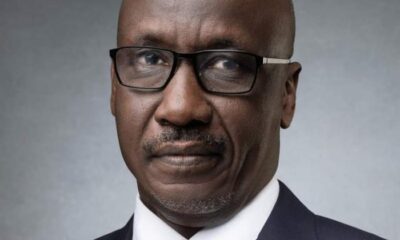Democracy & Governance
How The Working Class Outwit The Poshers In Nigeria Public Services: Why The Progenies Of Our Leaders Find It Difficult To Replace Their Parent -By Saifullahi Attahir Wurno
The irony was that even in the contemporary American or British politics that we upon site as example with, practice a reverse to our political culture. In the American politics, most of their political leaders attended an IV league school that can be attended only by the children of their Elites. Hence its not surprising that most of their leaders have some connection to their former leaders and business cycles. Example of the Bushes, Kennedies, Sununu, Trumps, Clintons, are all part of the Elite cycles.

Nigeria’s leadership begins long time ago with each part of the country adopting its age-long system of governance largely based on familyinheritance, this was was more so prominent among the leading tribes of Hausa/fulani, Yoruba kingdom, and the Kanuris.
The Northern leadership style was based on aristocratic system that begins as a form of Emirateship/Caliphate copying the Islamic system of governance where by a reputable, erudite and trustworthy scholar is selected as the leader who also bear the role of delegating his subordinates in charge of the various regions under him. With time, this beutiful system too turn in to family lineage where most of the post are apportioned to members exclusively of such families.
After about 200 years of practicing this Caliphate style, there came the British colonialist who systematically replaced the former and thus potentially reducing it’s influence. The British came up with Democracy as an alternative and more ‘civilized’ form of leadership.
Historical fact have shown how suspicious and disdain the established Aristocratic family view the western style of education, thus only the children of those less privileged in the society were allowed to be part of the colonialist education. The new recruits in the westen education were allowed only to obtained enough so as to become primary school teachers to replace their British scholars.
Despite persistent persuasion by the Colonialist toward the Aristocratic class to allow their children in to the system, only a few heed the call. It became even more difficult because the children of those Emirs in those days consider class room teaching a lowly profession that only deserved the lower class individuals.
With the beginning of political initiatives and the need for Nigeria’s independence, it became clear that only those acquainted with the western education deserve to represent the society, so no option was left but to send those trained teachers to occupy those position. That was the beginning of political life’s of Aminu Kano, Sa’adu Zungur,Yusuf Maitama Sule, Abubakar Imam, Inuwa Wada, Abubakar Tafawa Balewa, those together with the more lucky Aristocratic class whose parent quickly seize the opportunity that allowed them joining the System like: Sir Ahmadu Bello, Sir Muhammad Sanusi 1, Alh shehu Shagari, Sir Kashim, Alh Ibrahim Waziri, and others.
When the first Republic leaders were recruited, they were mostly from among the school teachers (especially in the Northern Nigeria). Tafawa Balewa, Aminu Kano, Abubakar Imam, were educated at home and later sent to United Kingdom for an equivalent Diploma course for a year after which they later started joining the political roles . Most of the Aristocratic class also acquire the education but decided to retain their family titles in the Emirates except few ( like Ahmadu Bello) that joined the partisan politics of those days.
Most of the First Republic (1960-1966) Regional leaders, Federal Ministers and top civil servants find their way through the same path. It was in a similar passion that the life of the previously tagged lower class individuals changed and became leaders of the new country.
After the collapse of the Democratic rule, the Army that seized power used the opportunity to install itself in power for the next 10 years hence appointing fellow Army officers as Regional Governors, Ministers, and Directors in to the various Agencies in the Country. The history of the rise of those Army officer was no different from where the former leaders came from, the Officers are mostly sons of middles and lower class individuals recruited mostly for the purpose of depending the country with no prior thought of one day steering it’s affairs.
The overall modus Operandi of Nigeria Army was coordinated by the British including the training in Sandhurst and other top Military colleges in the UK. Prominent figures in those time were ; JTU Ironsi ,Ojukwu, Shehu Yar’adua, T.Y Danjuma,Sani Bello, Yakubu Gowon, Murtala Muhammed, and Obasanjo.
After the Military haSenatorso Democracy of 1979, It was mostly through similar route that leaders of the second Republic (1979-1983) came to power.
Prominent figures include ; Alh Shehu Shagari, Alh Umaru Dikko, Alh Bello Maitama, Alex Ekweme, Abubakar Rimi, Adamu Waziri, and others.
The brief 5 years of the democracy was cut short by another military takeover that saw the emergence of another class of Military Elites this time more matured,experienced and knowledgeable. The period span for over 15 years( 1983-1999), where uncountable number of officers, civilians, and paramilitary officers got their way up through the social class ladder as Governors, Ministers, Contractors, head of Agencies, University Dons, Local Government Adminstrators, commissioners, and others.
Key figures during this period include Gen Buhari,Tunde Idiagbhon, Ibrahim Babangida, Mamman Vatsa, Sani Abacha,Oladipo Diya, Abdussalam Abubakar, Sama’ila Gwarzo, Shonekan, MKO Abiola, Bashir Tofa, Hamza Abdullahi,
During the Fourth Republic between 1999 to date uncountable working class individuals have got their way up as Presidents,Deputies, Governors, Senators, House members,Security Chiefs, Ministers, Commissioners and others.
My question remains where are the children of those our past leaders ranging from the first Republic to Fourth Republic?
From the officers side, where are the Children of Tafawa Balewa, JTU Ironsi, Yakubu Gowon,Shehu Yar’adua, Obasanjo, TY Danjuma, Ibrahim Babangida,Sani Abacha, Abdussalam Abubakar?
From the political side, where are the children of Tafawa Balewa, Shehu Shagari, Umaru Dikko, Aminu Kano, Abubakar Rimi?
Where are the children of all the former Presidents, Governors/Deputies, Senators, Ministers, and Members House of Representatives from 1999 to date?
There are numerous example of failed attempts made by the children of those highly placed individuals to secure some positions or starting a political carrier but is usually met with several obstacles that made it impossible for them to actualize their dreams or even assumed roles near to their parents.
Kola Abiola
Kola was the eldest son of the political heavyweight champions of the 90’s politics (MKO Abiola). His father was the very known figure, a business tycoon, and influencer of many Coups, who become the president-elect in 1993 election whose legacy lead to our Democracy day changed to ‘June -12’ after his mandate. But surprisingly his son Kola was not even near the power whose main ideology was known to be based on his father tutelage.
Mahdi Aliyu Gusau
Mahdi Aliyu Gusau was a former Deputy Governor in Zamfara State but his dream to become a Governor was tarnished early even before becoming a national figure like his father at a young age.
Muhammad Abacha
Muhammad was the eldest son of the revered Army General and one of Nigeria’s finest officers and military leader whose mark can never be forgotten in the history of the country. But unfortunately, his only son attempting to followTHEs footstep to serve the country have been consistently denied the opportunity to leave his mark.
Mustafha Sule Lamido
Mustafha was the son of the former Jigawa state Governor, Minister of Foreign Affairs, and National Secretary of SDP. He has been trying his shot at the Senatorial and Governotorial seats respectively and failed to secure any despite his father’s presence and still influence in the National politics.
Abba Riskuwa Muhammed
Abba was the son of the Nigeria’s beloved and charismatic leader Murtala Muhammad whose country can never forget his ambition to fight corruption and brings sanity in to public services. But his son was struggling to get recognition in the politics of his state to no avail.
SOME SUCCESS STORIES
Despite the above mention examples there have been households that have call their shot and were remarkably winning it. So far The House of Olusola Saraki were the only household that produced remarkable political stride whose performance outshine that of their father. Currently there have been Households to keep a radar on to see how they can emulate or even surpass their parents; Son of Nasir Elrufa’i, Son of Attahiru Bafarawa, Son of Kwankwaso, Son of Ganduje.
OUR CONTRAST TO THE AMERICAN AND BRITISH STYLE
The irony was that even in the contemporary American or British politics that we upon site as example with, practice a reverse to our political culture. In the American politics, most of their political leaders attended an IV league school that can be attended only by the children of their Elites. Hence its not surprising that most of their leaders have some connection to their former leaders and business cycles. Example of the Bushes, Kennedies, Sununu, Trumps, Clintons, are all part of the Elite cycles.
In the UK the situation was more apparent because in a study conducted, over 60% of the members in the Parliament attended the Elite public schools like Eton, Wensminster, Cambridge and Oxford. Another study have found that Oxford University alone have produced over 19 Prime Ministers. This is an indicator that people attending those schools are more likely to become leaders in the UK society. And only the wealthiest and Aristocratic class of the UK afford the tuitions of those colleges.
THE FACTORS
From my analysis, some of the factors that leads to the children of our political class shun their parent role or unable to secure it were the following;
1) OVERBOOKISHNESS
Those Elite sons were too Bookish which limit their ability to have direct interaction with the real happening in the society. Their Minimum level of education upon is PHDs and Masters although an advantage but in reality it limits their capacity to go higher than their parents whose only certificates are of secondary and Diploma but with good human interactions and exposures.
2) BUTTERFLY MAGGOT HATCHING EXPERIENCE
The inability of the Nigeria’s Elite to allow their children to carve for themselves from early childhood ( as a show of love ) due to over protection, limited interaction, limited experience, this became a disadvantage to them later in life, because this would definitely denied them the nerve and courage to persevere the rigor required to ascend the ladder of political life in Nigeria. At the end they became the beautiful butterfly but with a handicap wings since it has not been allowed to hatched by itself.
3) TESTAMENT OF PARENTS OR THEIR BAD EXPERIENCE
Some parents deliberately denied their children to ever engaged in any political ambition. This was evidence from the bad experience they had during their journey of machinations, thuggery, assassinations, black mailing and more.
Finally, it would be for the good of the society if the poshers would be participating in the public services especially in the absence of their parents so as not to use their political influence. This would help to strength our Democracy, they would also add value to our politics because of their direct mentorship, bloodline good qualities of their parents and NY sharing to the public documented written experience and techniques followed by their parents. It would also help them fulfill their personal ambition as dignified citizens who have right to aspire for any position without hindrance by their parents past mistakes or otherwise.
Saifullahi Attahir Wurno wrote
Saifullahiattahir93@gmail.com



















